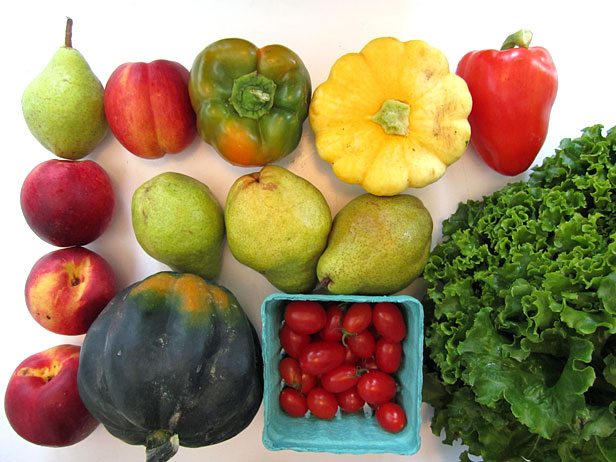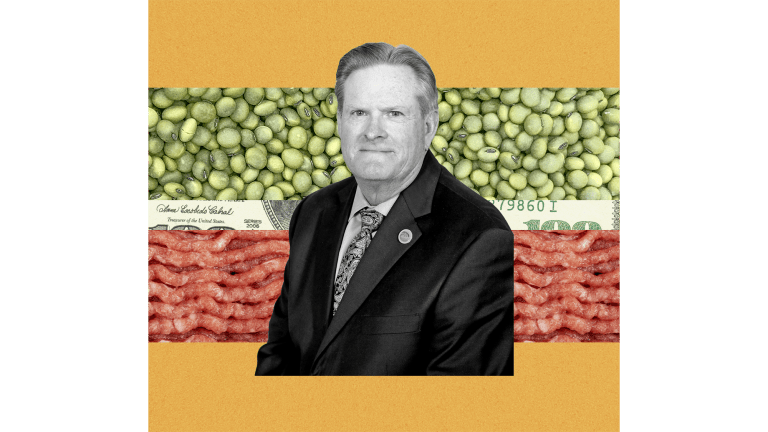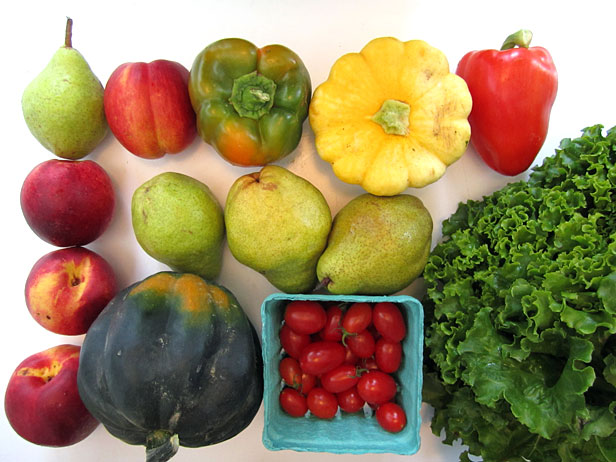 Week 15’s bountyJennifer Prediger photos
Week 15’s bountyJennifer Prediger photos
It’s week 15 in this Urbivore’s Dilemma series in which yours truly journeys from takeout food to Community Supported Agriculture maven. My how time flies when you’re eating well! This week’s fruit and vegetable share had acorn squash, lettuce, shelling beans, summer squash, sweet peppers, mini tomatoes, pears, and nectarines.
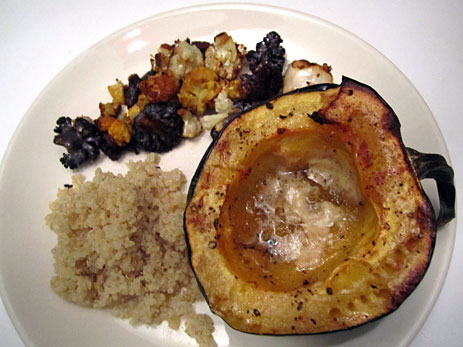 I sampled fall with roasted acorn squash. I went wild and followed Paula Dean’s squash-roasting recipe, though I didn’t use maple syrup, brown sugar, or as much butter. So actually, I didn’t follow the recipe at all — I used it to improvise from. I used a small amount of local honey and butter. Mrs. Dean said to cook the squash for an hour. I didn’t do that either because I have an express oven. What that means is that my oven is so old that I doubt there were regulations back then that governed how hot it could get. My Caloric Heritage Series oven is a hot beast and cooks everything in about half the time.
I sampled fall with roasted acorn squash. I went wild and followed Paula Dean’s squash-roasting recipe, though I didn’t use maple syrup, brown sugar, or as much butter. So actually, I didn’t follow the recipe at all — I used it to improvise from. I used a small amount of local honey and butter. Mrs. Dean said to cook the squash for an hour. I didn’t do that either because I have an express oven. What that means is that my oven is so old that I doubt there were regulations back then that governed how hot it could get. My Caloric Heritage Series oven is a hot beast and cooks everything in about half the time.
The squash, in its sweet, warm, savory glory, gave me a glimpse of Thanksgiving pies and sweet potatoes to come. Served with white quinoa and a roasted medley of purple, orange, and white cauliflower, this made for a lovely early fall, cozy meal. The mini tomatoes and lettuce made a fresh salad that said summer was still here, too. And my word, the pears and nectarines! If I were allowed only two fruits to have at that ripeness all year round, I’d pick those two. My cooking compadre made an unbelievable pear dessert with ricotta cheese and honey. The nectarines were heaven just by themselves. We ate the last one was yesterday. Hope I can hold onto that juicy sunrise of sweetness as fall comes.
The sun cast a golden hue on the neighborhood as I went to pick up my CSA food the other day. Things were aglow and I wanted to buy some fresh eggs with golden yolks. The most delicious eggs I’ve ever had came from Stone Barns of Blue Hill restaurant fame. I have stopped buying eggs from the grocery store, as I recently learned that about 99 percent of eggs come from factory farms. Even the pretty brown, expensive ones that seem so happy with their cage-free and free-range labels are from barely better factory farms. And with the recent salmonella outbreaks causing over 500 million eggs to be recalled, I’ve become rather egg-shy.
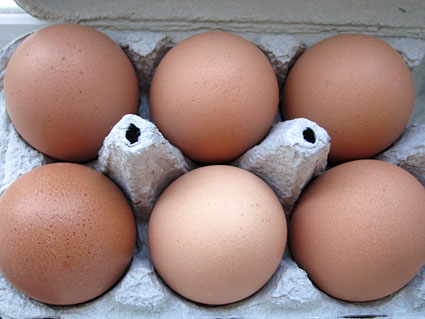 Farm eggsThere’s a farm that sells eggs outside of the CSA pickup called Dines Farm. I’ve gotten them in the past and take comfort thinking these eggs come from a farm with chickens who are living happier, insect-eating, running-around lives. It occurred to me that I may have been telling myself another happy story about my eggs, in the same way the cage free and free range labels created these false happy stories. I’d had an egg-piphany and realized I need to be conscientious about the things I consume and know the sources, whether they’re big or small. I mean, how did I know these chickens were happy or treated well?
Farm eggsThere’s a farm that sells eggs outside of the CSA pickup called Dines Farm. I’ve gotten them in the past and take comfort thinking these eggs come from a farm with chickens who are living happier, insect-eating, running-around lives. It occurred to me that I may have been telling myself another happy story about my eggs, in the same way the cage free and free range labels created these false happy stories. I’d had an egg-piphany and realized I need to be conscientious about the things I consume and know the sources, whether they’re big or small. I mean, how did I know these chickens were happy or treated well?
So I called the farm. Farmer John Dines answered the phone on the second ring. I felt a little nervous calling up this farmer. I didn’t want him to think I was just calling to scrutinize how he treats his birds. I was calling also out of curiosity. John, perhaps a man of few words — though hard to tell in a three-minute conversation — was pleasant to this city slicker. He told me the chickens are Comet chickens and that they are “running around.” I asked if people can come and see the farm. He seemed open to that idea and asked what my schedule was like and took my phone number.
So maybe I’ll have a trip to the farm to meet the Comets. It’s nice to know I can speak directly to the farmer who produces these eggs. Dines Farm in Oak Hill, N.Y., is about a 3-hour drive. Not that everyone has the time to go check out their chickens 3 hours away, but I’m thinking of making a new, somewhat flexible egg rule for myself. Try and eat them only if I have seen where and how the chickens live. There are other advantages to this, too — the happier the chickens, the more delicious and nutritious the eggs.
Readers, where do you get your eggs? Have you been to visit the chickens? While you were there, did you see a chicken cross the road and ask it why?
Next week’s CSA share will have tomatoes, soy beans, leeks, lettuce, summer squash, cucumber, plums, and Concord grapes. What’s in your CSA boxes around the country this week, readers? What fall foods are you looking forward to?

